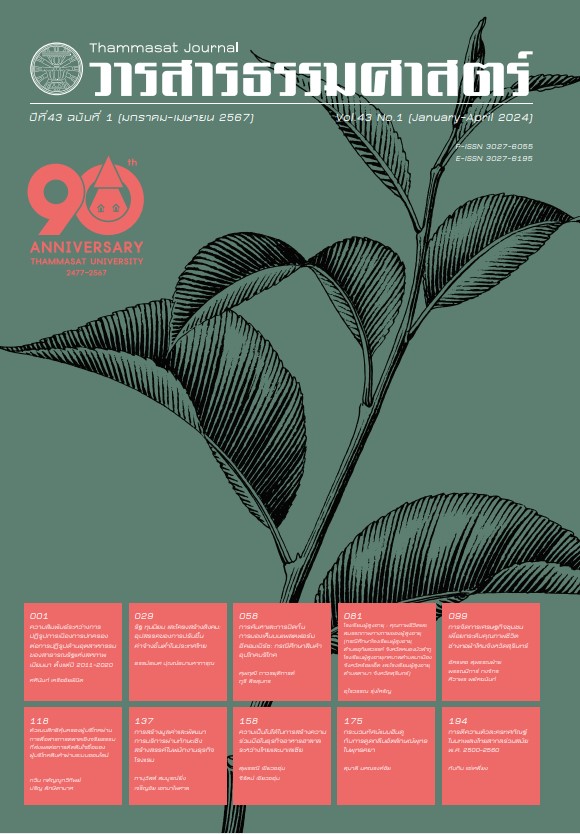The Interpretation of Dasakantha in Modern Thai Songs in year 1957-2017
Main Article Content
Abstract
The objectives of this article were (1) to study how Dasakantha was mentioned in modern Thai songs from 1957 to 2017 and (2) to interpret music composers’ perspectives on Dasakantha. The findings revealed that the contents of the songs were divided into two periods : around the beginning of 1957-2002 and 2006-2017. The contents shared in both periods were the role of Dasakantha as depected in the literature, including the idnapping of Sita and flirtation. The contents that appeared only in each period are the events that did not appear in the literature criticism of the character’s behavior in the period around the beginning of 1975-2002 was about deceitfulness. However, in 2006-2017, Dasakantha’s behaviors were characterized by faithfulness in love, dedication to love, and humility of being just a giant. The interpretation of the Dasakantha’s character around the beginning of 1957-2002 presented a much worse image than that portrayed in the literature. Meanwhile the interpretation of the character after 2006 was more understandable and sympathetic to his actions than before. The popularity of Dasakantha in modern Thai song for over half century showed that the relationship between people in society and Dasakantha was not just a literary reader or a music listener with a character in literature but people also had tactfully linked their own feelings with Dasakantha’s character.
Article Details
References
กรมศิลปากร. (2550). บัณณ์ดุรีย์ : วรรณคดีีกับเพลง เล่ม 2 ภาควรรณคดีีไทยในเพลงไทยสากล. กรุงเทพมหานคร : กระทรวงต่างประเทศ, กรมศิลปากร
กฤษฏิ์ เลกะกุล. (2561, 4 ธันวาคม). แร็ป-ฮิปฮอป ลำนำสะท้อนชีวิตแอฟริกัน-อเมริกััน สู่บทเพลงแห่งเสรีภาพในสังคมไทย. คิด: Creative Thailand. https://www.creativethailand.org/view/article-read?article_id=30491
ฐิรวุฒิ เสนาคำ. (2549). เหลียวหน้าแลหลังวัฒนธรรมป๊อป. กรุงเทพมหานคร : ศูนย์มานุษยวิทยาสิรินธร (องค์์กรมหาชน).
ทิพย์นภา หวนสุริยา. (2563, 27 ตุลาคม). จิตวิทยากับการเลือกข้าง. Psychology Chulalongkorn University, จาก https://www.psy.chula.ac.th/th/tag/radio-documentary-script/page/2
ธัญญา สังขพันธานนท์. (2559). แว่นวรรณคดีี ทฤษฎีร่วมสมัย. กรุงเทพมหานคร : นาคร.
นฤพนธ์ ด้วงวิเศษ. (2560). เพศในเขาวงกต : แนวคิดทฤษฎีเพศในวัฒนธรรมบริโภค. กรุงเทพมหานคร: ศูนย์มานุษยวิทยาสิรินธร (องค์์กรมหาชน).
ปรมาภรณ์ ลิมป์เลิศเสถียร. (2557). เพลงนอกใจ : ทางออกของคนไทยในสังคม. วารสารมหาวิทยาลัยหอการค้าไทย, 34(1), 211 - 224.
พระบาทสมเด็จพระพุทธยอดฟ้าจุฬาโลกมหาราช, (2559). บทละครเรื่องรามเกียรติ . 4 เล่ม. กรุงเทพมหานคร : ศิลปาบรรณาคาร.
พรทิพย์์ พุกผาสุก. (2551). เพลงไทยสากลจากวรรณคดีีไทย. กรุงเทพมหานคร : โรงพิมพ์บริษัทแม็กซ์เอ็กซ์เพรส จำกัด.
ภัทรวดี ภูชฎาภิิรมย์์. (2549). วัฒนธรรมบันเทิงในชาติิไทย การเปลี่ยนแปลงของวัฒนธรรมความบันเทิงในสังคม. กรุงเทพฯ พ.ศ. 2491-2500. กรุงเทพมหานคร : มติิชน.
วรรณวิภา วงษ์เดือน. (2562). ตัวละครจากวรรณคดีีไทยในบทเพลงไทยสากล. [วิทยานิพนธ์อักษรศาสตรมหาบัณฑิต]. มหาวิทยาลัยศิลปากร.
วริษฐา แซ่เจีย. (2564). “ถึงตัวร้ายที่เรารัก…” อะไรทำให้หลายคนหลงใหลตัวร้ายมากกว่าฮีโร่? The Matter. https://thematter.co/social/why-are-we-attractef-to-villains/145756
เสาวณิต จุลวงศ์. (2557). วงวรรณกรรมไทยในกระแสหลังสมัยใหม่ (ตอนที่ 1). วารสารสงขลานครินทร์ฉบับ สังคมศาสตร์และมนุษยศาสตร์, 19(4), 3-35.
เสาวณิต จุลวงศ์. (2557). วงวรรณกรรมไทยในกระแสหลังสมัยใหม่่ (จบ). วารสารสงขลานครินทร์ ฉบับสังคมศาสตร์และมนุษยศาสตร์์, 20(1), 3-28.
Bethany Klynn. (2021, July 6). Cognitive bias : What it is and how to overcome it. Better Up. https://www.betterup.com/blog/cognitive-bias
Carlos Allende González Velázquez. (2021). Why We Enjoy Sad Stories and Identify With Immoral Characters: the Role of Compassion. Fielding Graduate University Press.
KelloggInsight. (2020, March 2). When Do We Identify with the Bad Guy?. Kellogg Insight. https://insight.kellogg. northwestern.edu/article/identify-with-the-villain
Rebecca J. Krause and Derek D. Rucker. (2019). When ‘Bad’ is ‘Good’ : The Magnetic Attraction of Villains. The Assciation for Consumer Research. https://www.acrwebsite.org/volumes/2552209/volumes/v47/NA-47
Rebecca J. Krause and Derek D. Rucker. (2020). “Can Bad be Good ? The Attraction of a Dearker Self”. Psychological Science, 31(5), 518-530.

